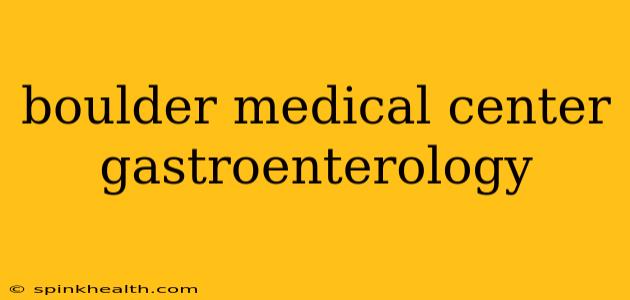Boulder, Colorado, nestled amongst breathtaking mountain scenery, also boasts a robust healthcare system. At the heart of this system lies Boulder Medical Center (BMC), a respected institution offering a comprehensive range of medical services, including a dedicated Gastroenterology department. This department handles a wide spectrum of digestive health issues, from routine check-ups to complex surgical procedures. Let's delve into what makes BMC's gastroenterology services stand out and explore the common questions patients often have.
What Services Does Boulder Medical Center's Gastroenterology Department Offer?
BMC's Gastroenterology department offers a wide array of services designed to address virtually every aspect of digestive health. Their comprehensive approach ensures patients receive the most appropriate and effective care, ranging from preventative screenings to advanced treatments for chronic conditions. This includes, but is not limited to, colonoscopies, endoscopies, esophageal pH monitoring, and treatment for conditions like GERD, Crohn's disease, and ulcerative colitis. They also offer expertise in liver disease management and pancreatic issues. The team approaches each patient's case with a personalized plan, taking into account their unique medical history and lifestyle. Their focus extends beyond simply treating symptoms; they aim to educate patients about preventative measures and long-term health management.
What are the Common Digestive Issues Treated at Boulder Medical Center?
The Gastroenterology department at BMC sees a wide range of patients with various digestive concerns. Some of the most common issues addressed include:
-
Gastroesophageal Reflux Disease (GERD): This chronic condition affects millions and involves the backward flow of stomach acid into the esophagus, causing heartburn and other symptoms. BMC's specialists employ various diagnostic and treatment methods, ranging from lifestyle changes and medication to minimally invasive procedures.
-
Irritable Bowel Syndrome (IBS): IBS is a functional gastrointestinal disorder characterized by abdominal pain, bloating, and changes in bowel habits. The BMC team takes a holistic approach, considering dietary factors, stress management, and medication options to help patients manage their symptoms.
-
Inflammatory Bowel Disease (IBD) (Crohn's Disease and Ulcerative Colitis): These chronic inflammatory conditions affect the digestive tract, causing inflammation and damage. BMC’s specialists utilize advanced diagnostic techniques and offer a range of treatment options, including medication and potentially surgery, to help manage IBD.
-
Celiac Disease: This autoimmune disorder is triggered by gluten consumption, leading to damage in the small intestine. The BMC gastroenterology team conducts diagnostic testing and offers guidance on managing a gluten-free diet.
-
Colon Cancer Screening and Prevention: Colonoscopies are a cornerstone of colon cancer prevention. BMC’s Gastroenterology department offers convenient and comfortable colonoscopy procedures, along with detailed post-procedure guidance.
How Do I Make an Appointment with a Gastroenterologist at Boulder Medical Center?
Scheduling an appointment at BMC's Gastroenterology department is typically straightforward. You can usually do this through their online portal or by calling their scheduling department. Be prepared to provide your insurance information and a brief description of your symptoms. The staff will help guide you through the process and ensure you're seen by the appropriate specialist. They will also assist with pre-procedure instructions if a diagnostic test is required.
Does Boulder Medical Center Offer Advanced Diagnostic Procedures?
Yes, Boulder Medical Center offers a comprehensive range of advanced diagnostic procedures to help accurately diagnose and monitor digestive conditions. These may include but aren't limited to:
- Endoscopy: This procedure uses a thin, flexible tube with a camera to visualize the inside of the esophagus, stomach, and small intestine.
- Colonoscopy: This procedure allows for the visualization of the large intestine and rectum, primarily for cancer screening and polyp removal.
- Capsule Endoscopy: This involves swallowing a small camera pill that transmits images as it passes through the digestive tract. This is particularly useful for visualizing the small intestine.
- Esophageal pH Monitoring: This test measures the acidity levels in the esophagus to assess the severity of GERD.
- Biopsies: Tissue samples are taken during endoscopy or other procedures for microscopic examination.
These advanced procedures, coupled with skilled interpretation by experienced gastroenterologists, ensure accurate diagnoses leading to the most effective treatment plans.
What is the process for scheduling a colonoscopy at Boulder Medical Center?
Scheduling a colonoscopy at BMC typically involves an initial consultation with a gastroenterologist. This consultation helps determine the necessity of the procedure, reviews medical history, and addresses any concerns. The staff will then provide detailed instructions on bowel preparation, necessary for a successful procedure. This usually involves a specific diet and the use of laxatives in the days leading up to the colonoscopy. The actual procedure is typically performed as an outpatient procedure, meaning you can go home the same day. Following the procedure, you'll receive post-procedure instructions and, if necessary, a follow-up appointment to discuss the results.
This information is for general knowledge and should not be considered medical advice. Always consult with a healthcare professional for any health concerns or before making any decisions related to your health or treatment. For specific information about services at Boulder Medical Center, visit their official website.

